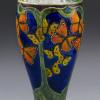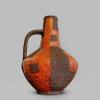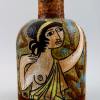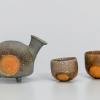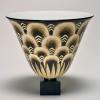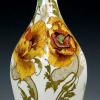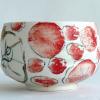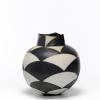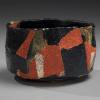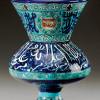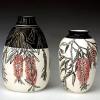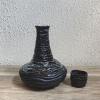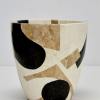A visual exploration on the theme of women using their pottery in performance, creation, transportation, market sales and rituals.
Toubou woman souvenir seller. western Ennedi. Chad
Photo – © Jacques Taberlet.
The traditional usage of pottery taps into a rich vein of customs, from tribal ceremony and production techniques to being integrated into dance performance and street festivals. The ancient traditions used the pot as a metaphor for sustenance and divine plentitude following the ancient tribal belief of enacting visual rituals to attract abundance. The Bihan Parab “Indigenous Seeds Festival ” in India has a procession of women carrying decorated earthen pots containing seeds accompanied by youths with drums, which passes through all the villages.. The leading woman carries a special pot constructed with paddy seeds, symbolizing Lakshmi, the Goddess of Wealth. Ritual dancing among worshippers of the thunder deity, Shango, sometimes balance a pottery container of fire on their heads while dancing. The Egbado Yoruba have dances that include balancing “delicate terracotta figures” on their heads while moving their arms and torso.
Some of the surviving ancient cultures value and preserve these traditions even more so now with the pervasive growth of modern technology.
Selling Calabashes on the street in Mali, Africa
The American Native Indians have undergone a revival of their indigenous pottery art and rescued techniques and knowledge from the claws of obscurity and created successful enterprises from their traditional arts. It has been recognized as an essential path to preserving their ancestral traditions and craftsmanship and has led to the advancement of their art forms and become a vital resource.
It’s fascinating to see that many of these cultures prefer to adhere to the ancient traditions of their ancestors, excavating their clay, using hand assembly and firing their pots using age-old practices rather than modern techniques. The reverence to their traditions has reinforced their culture through its methods, simplicity and spiritual observations of feast days, seasonal festivals and tribal laws. These customs can date back thousands of years and carry a deep resonance so its understandable how pottery making and other crafts have helped to maintain a sense of cohesiveness in their culture. An ancient belief existed that Athena, the patroness of crafts, imparted rejuvenation to women who dedicated themselves to creative tasks such as – pottery, weaving, tapestry, and playing music.
Sometimes the whole family is involved in the production of the pottery crafts, and the woman are the primary artisans. Their innate sensitivity is respected, especially with certain pots and figures created with specific decorations that can impart spiritual awareness through their physical handling. In some instances, the pottery arts is solely a matriarchal endeavor.
Traditional pottery making at Kalabougou village in Mali
Kalabougou women using tree cuttings to make a mound to fire their pots
Segou, Mali
janetgoldner.com
Women from the village of Kalabougou on the River Niger baking their hand made clay pots
Quenching – Immersing hot pots into a berry mixture. The older woman in the background is picking up a smaller pot with a pair of tongs
A Kalabougou woman applying a red stone slip for glazing, from an art market, to the formed and dried pot before firing.
janetgoldner.com
Kalabougou women firing pots, Mali – Africa
Allan Rickmann – flickr
Female potter hand making large clay pots at the village of Kalabougou
Tribal woman forming a pot – Kalabougou village
photo by Jacqueline Hoerter & Patrick Houdebine
See video below for more Kalbougou Pottery
Fratelli Fanciullacci jug with glazed and unglazed surface
Pipe smoking female potter
Ceramic is an art form exclusive to women among the Karajá in Brazil
Photo: Vladimir Kozak
Acasia wood figure of a servant girl. New Kingdom, Egypt
Louvre Museum
African Zulu girl carrying a traditional pot
Alfarera of Cocucho in Charapan, Mexico – making a pot with her daughter
Selling pots at Hassan Nagar in city of Hyderabad
Zoraida performing the Pot Dance Choreography as part of the original Bal Anat belly dance troupe begun by Jamila Salimpour in 1968 in California
Bal Ana dancing
Sotho woman with pot, ZA
Woman carrying pot in a Olbia Tempio street parade, Italy
Dogon Tribe women with pots
Apache woman with woven pot
Photo – Native News Network
Children playing Matka, a traditional Indian game where a pot of ghee is broken.
Reclining women with pot – Japanese lithograph – Muramasa Kudo
Hopi woman with a jar. Their art used symbols and signs to represent their ideas, beliefs, dreams, and visions.
” The most successful imitator of this ancient ware, who is not a Hopi at all, but the Tewa woman Nampeyo, of the village Hano, says that its superiority was obtained by the use of lignite, by which the prehistoric potters were able to fire their vessels for several days; but a well-informed traditionalist, on the contrary, asserts that it is the result of burying the clay in moist sand for a long time, perhaps two moons, which ’caused something in the clay to rot’.” – crystalinks.com
Up to 400 women participating in a yatra ( pilgrimage ) in a celebration of their identity as women and equal human beings. In defiance, they took water from a pump at the Ganges River designated for use only by upper caste peoples, which excluded them. After they took the water back to their villages they returned to the Ganges riverside once again, throwing the pots into the river, and collectively taking a vow that they would not let themselves be oppressed in the year ahead.
(WNV / Priyanka Borpujari)
Ganges Yatra – Bihar’s Khagaria district – 2011
Photo by 20th-century Indian photographer A.L.Syed
Indian girl weaving Photo by A.L.Syed
Indian water bearers
enkaustikos.blogspot.com.es
Painting handmade coil vases, – Lucinda Mudge
The Gallery at Grande Provance, Franschhoek, South Africa
Nesta Nala—famous for her sought after pottery specifically the ‘Ukhamba’–a smoke black, thin walled, round bottomed beer pot,
Pot bearing women walking in the early morning through giant Baobab trees to the market in Madagascar, 2006
phoho- Beth Moon
A women strolling past a pottery shop – Jaisalmer, Rajasthan
indiapictorial.com
Painting pots in Pondicherry
A woman from the Kabylia and Aures mountains making pottery
A Purepecha Woman with her clay pots in Cocucho, Michoacan, Mexico
Rosa Covarrubias circa 1926 by Edward Weston
Royal Worcester ‘Egyptian Water Carrier’ figurine modelled by James Hardey
1919
Nuer woman, Sudan
Art Deco statue of women with pot – San Diego City & County Administration Building
penfoto – flickr
Street art in Senegal
South Tunisian girl with pot
‘The daily grind’– Traditional painted house in Kassena, Burkina Faso.
By Louis Montrose
An old postcard photo of a Bedouin girl in Tunisia
Renown Venda potter, Rebecca Matib
Woman racing with Matka earthen pots in the desert at the Bikaner camel festival-2011
Vintage postcard of a Chaouri/Berber girl
Women painting a mud house with zigzag notifs – Kassena Compound, Ghana
An Afghani women wearing a traditional outfit
Pot emporium, Jaipur, India
A women wearing a tribal dress in Jaisalmer, India
Photo J. Versteeg
Women carrying large water jars
Figurine of Grecian man and woman – Royal Dux porcelain
From the book, African Image by Sam Haskins
Woman with Urn – French Art Nouveau
1900’s
French Art Deco Figural Statue by Pierre LeFaguays
1920’s
Detall de les rajoles by Matilde Martínez
Raks Sharqi veil dancing on elevated heels with pots
Daasanach warrior girl
The Daasanach tribe is one of the ancient tribes of Africa. These pastoralists live in three different East African countries, Kenya, the Sudan, and Ethiopia.
Terracotta figure of Rebecca at the well by Friedrich Goldscheider
19th Century
Pâte de verre, Vase by Gabriel Argy-Rousseau (1885-1953)

Mursi tribe woman with pot, Ethiopia

Photo Irving Penn – 1967

Welcome Ceremony. Rajasthan, India

Royal Dux Art Nouveau Ceramic Figural Bowl

Sculpture by Furio Piccirilli
Photo by Eugen Neuhaus
Kalabougou pottery in Mali
Also see the Veniceclayartists post – Women with Pots
NEXT POST — ‘2 ceramicists with vivid illustration’































































